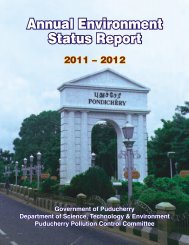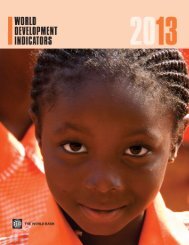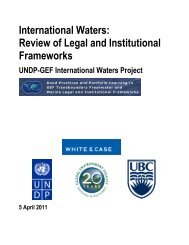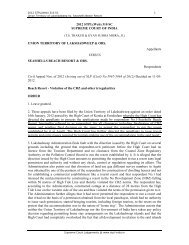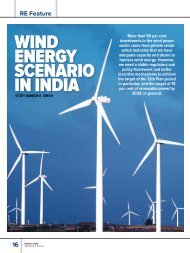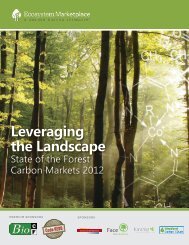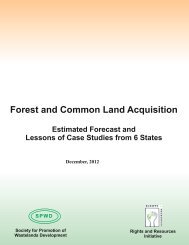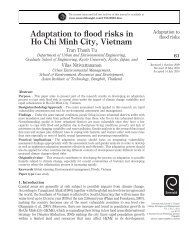DEFORESTATION AROUND THE WORLD - India Environment Portal
DEFORESTATION AROUND THE WORLD - India Environment Portal
DEFORESTATION AROUND THE WORLD - India Environment Portal
You also want an ePaper? Increase the reach of your titles
YUMPU automatically turns print PDFs into web optimized ePapers that Google loves.
92<br />
5. Conclusions<br />
Deforestation Around the World<br />
Defforestation, degradation and in some cases desertification even of Dinaric Karst started<br />
early in prehistoric times. They reached the peak in the second half of the 18 th and in the first<br />
half of the 19 th century. In any case, the reason was human factor, the economy with no<br />
attitude to sustainability at all. During the last thousand years it is possible to see the<br />
attempts to prevent the forest or even to meliorate, to reforest degraded lands. By the<br />
middle of the 19 th century such attempts were mainly unsuccessful, but from that time on<br />
the situation started to change rapidly. At the beginning, reforestation was a sort of massactivity<br />
while nowadays other factors join it. The general perception of the importance of a<br />
forest and of the sustainability helped a lot, but also the change of economy and activity of<br />
the population of the Dinaric Karst, the decline of the agriculture emphasized. Maybe the<br />
Dinaric Karst is turning to the other extreme – to be overgrown (Fig. 19). In Slovenia, on the<br />
Kras particularly specialists as well as laymen started to ask: how to prevent the Kras from<br />
becoming overgrown? “How to reasonably stop the overgrowing of Kras” is the title of a<br />
round table organized by the review “Kras” at Nova Gorica in 1997. The discussion also<br />
showed that foresters suggested replacing slowly black pine with oak (Mlinšek 1993).<br />
The foresters also suggested that Kras should be a field experimental laboratory of<br />
international importance to study the revitalization of a completely degraded landscape.<br />
Especially important should be the study of the revitalization of thermophile associations,<br />
which are the most affected and at the same time the most suppressed and neglected by the<br />
World’s public (Mlinšek, 1993).<br />
6. References<br />
Anonym (2001). Pogozdovanje krasa (reprint). Avtonomna dežela Furlanija Julijska krajina,<br />
Deželno ravnateljstvo za gozdove in parke, Trst<br />
Atkinson, I. (1979). The Viking Ships. Cambridge University Press, ISBN 0 521 21951 5,<br />
Cambridge – London etc.<br />
Azarov, E. (1994). Črni bor na Krasu. Kras, No. 4, (1994), pp. 18-21, ISSN 1318-3257<br />
Cabanes, P. (2002). Iliri od Bardileja do Gencija. Svitava, ISBN 420228055, Zagreb<br />
Culiberg, M., Kaligarič, M., Lovrenčak, F., Seliškar, A., Zupančič, M. (1997). Soil &<br />
Vegetation. In: Slovene Classical Karst Kras. Kranjc, A., pp. 103-129, ZRC SAZU,<br />
ISBN 961-6182-42-0, Ljubljana<br />
Cvijić, J. (1966). Balkansko poluostrvo i južnoslovenske zemlje, Zavod za izdavanje učbenika SR<br />
Srbije, Beograd<br />
Cvijić, J. (2000). Karst, geografska monografija. In: J. Cvijić Sabrana dela. Knjiga I, Stevanović,<br />
Maletić, Ranković, Kulenović-Grujić, Jovanović, pp. 203-323, SANU & Zavod za<br />
izdavanje udžbenika SR Srbije, ISBN 86-17-08301-8, Beograd<br />
Djikić, S. (1957). Historiski razvoj devastacije i degradacije krša u Bosni i Hercegovini.<br />
Proceedings of Savezno savjetovanje o kršu, 3, Split, June-July 1957<br />
Dular, J., & Božič, D. (1999). Železna doba. In: Zakladi tisočletij, Aubelj, B., pp. 98-183,<br />
Modrijan, ISBN 961-6183-68-0, Ljubljana<br />
Evliya, Ç. (1957). Putopis, odlomci o Jugoslovenskim zemljama. Svjetlost, Sarajevo<br />
Gams, I. (1991). The origin of the term Karst in the time of transition of Karst (Kras) from<br />
deforestation to forestation. Quaderni del Dipartimento di Geografia, No. 13, (1991),<br />
pp. 1-8, ISSN 1120-9682



